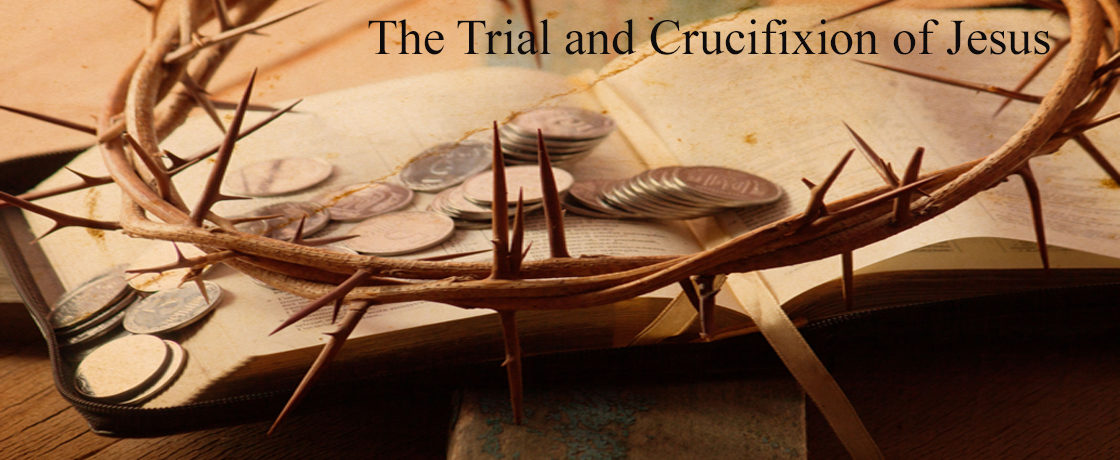The Trial and Crucifixion of Jesus
The Trial and Crucifixion of Jesus
John 18-19
John reveals that in the last hours of Jesus’ life on earth He was not a martyr, but a voluntary sacrifice. He was obedient to His Father’s will. Jesus is in complete control of His destiny as He makes His way to the cross.
Jesus Is Arrested in the Garden (18:1–11)
John 18:12 Then the band and the captain and officers of the Jews took Jesus, and bound him.
Judas brings Jewish officials and Roman soldiers to Jesus.
Jesus before Annas (18:12–14)
The Jewish officials’ arresting officers brought Jesus first to Annas, and then to Caiaphas. Annas, a former High Priest, was to some extent the power behind Caiaphas, his son-in-law.
Peter’s first denial of Jesus (18:15–18)
Warming by the fire… this is within the temple complex. Annas is in view, and the courtyard atrium is connected with his house.
Interrogation of Jesus before Annas (18:19–24)
In a formal Jewish hearing in the first century, scholars propose it may have been illegal to question the defendant. A case had to rest on the weight of the testimony of witnesses.
Jesus’ response in John 18:21, “Why ask you Me? Ask them which heard Me what I have said to them: behold, they know what I said.”
Jesus’ challenge reveals something illegal, and so an official slaps Jesus, thinking He offended the High Priest. Annas recognizes that he will get nowhere with Jesus and sends him to Caiaphas. To get Jesus before Pilate, the legal charge must come from the reigning high priest, Caiaphas.
The trial of Jesus before Pilate (18:28–19:16a)
John reports far more details of this trial before Pilate. The dominant theme is the kingdom, the authority of Jesus.
Delivering Jesus, Jewish authorities refused to enter Pilate’s headquarters, preferring to stand outside in the colonnade. They wished to avoid ceremonial uncleanness.
Meeting them outside Pilate asked, “What charges do you bring against this mam?” formally opening the judicial proceedings.
The fact that Roman troops were used at the arrest proves that the Jewish authorities had communicated something of this case to Pilate in advance.
Jewish authorities had to secure a guilty verdict to get the outcome they desired. They had to persuade Pilate to find Jesus guilty of a capital crime.
Pilate questions Jesus (18:33–38a)
Pilate begins his interrogation of Jesus, “Are you the king of the Jews?” Jesus becomes the interrogator; the prisoner has become the judge. Jesus asked, “Did you decide this or did you get it from the Jewish officials?” Pilate answers, the royal pretensions of any Jew mean nothing to me personally; he has no stake in their outcome.
Jesus confirmed His kingship, and said it was not in this world.
Pilate tries to release Jesus, but the Jews rejected it.
They wanted Barabbas instead.
Jesus is Beaten the first time. (19:1)
Pilate steps out of the praetorium after Jesus is beaten, addresses the Jews. He delivers his verdict, not guilty, then dramatically presents Jesus, a terrible sight, swollen, bruised, and bleeding. But for them, it is not enough. The Jews’ demand is death.
Pilate Questions Jesus a Second Time
Back inside the praetorium, Pilate seeks to alleviate his own fear by questioning Jesus about his origins: “Where are you from?”
Jesus is In Control (19:11)
Jesus is Sentenced (19:16)
Jesus is Crucified (19:17)
The soldiers administered the terrible scourging, and Jesus carries His own cross, erected in a prominent busy place for all to see.
Jesus Dies (19:34)
Jesus handed over His spirit, no-one took His life from Him. He had the authority to lay it down of His own accord, the culmination of total obedience.
The Burial of Jesus (19:38–42)
Joseph of Arimathea was a rich member of the Sanhedrin. His only connection was with the burial of Jesus. The garden tomb in which Jesus was buried belonged to him. Under Roman law, the bodies of those crucified for sedition were normally left to the vultures, as the culminating picture of indignity and shame.
John records the events of the last hours of Jesus with the purpose of showing us that Jesus is in control of all that happens.
In the past. In the present. In the future.

